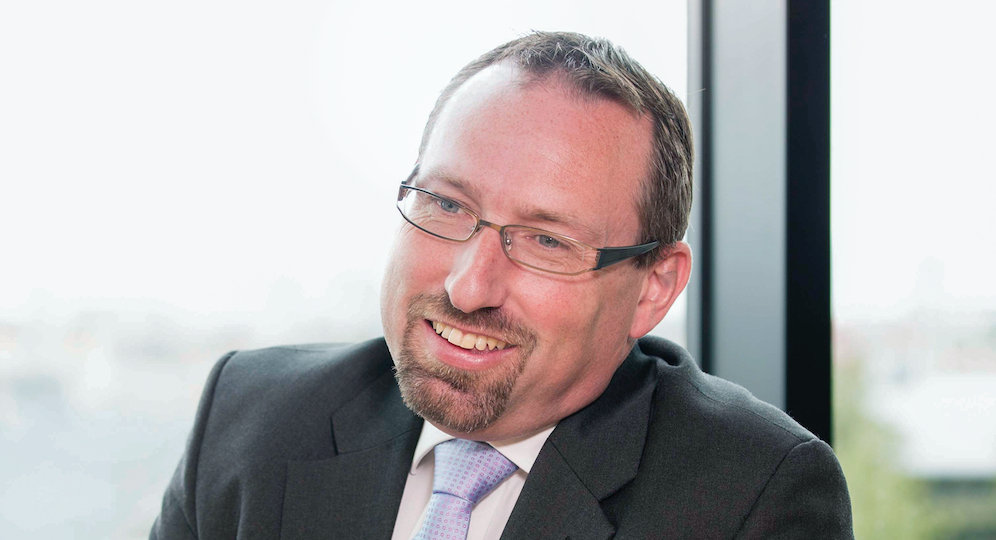
One of the biggest barriers to sensible decision-making — not just in investing, but in every walk of life — is confirmation bias. We actively seek out, and give far more prominence than we should, to information that reinforces our existing beliefs.
The best antidote to confirmation bias is to do the opposite — to go out of your way to talk to people who take the opposing view and genuinely try to see things as they do.
In that spirit, I recently went to Edinburgh to meet STUART DUNBAR, Partner at the investment company Baillie Gifford. Founded in 1908, Baillie Gifford works mainly with institutional clients. It currently manages about £200 billion for clients all over the world, mainly in equities.
Considering it’s an advocate of active money management, I have more in common with Baillie Gifford than you might imagine. For example, the firm has been highly critical of the UK asset management industry and its “gravy train” culture. It has also been singled out for praise by my Transparency Task Force colleague Chris Sier for the way that it sets out its fees and charges.
So, leaving aside the rival merits of active and passive investing, how much common ground would Stuart Dunbar and I manage to find?
Stuart, what would you say it is, more than anything, that distinguishes Baillie Gifford from other active fund houses?
It’s best encapsulated in timescale probably. We run our own business on a 10- or 20- year view. That means the only way we are going be successful is if our clients are successful, and stick with us for that sort of length of time. I think we are very fortunate to be a private company with shareholders that let us operate in a stable fashion. It’s an industry which, by definition, is subject to the volatility of markets and hence revenues and so on. So, fundamentally, what makes us different is our ability to take the long view and pretty much ignore day-to-day noise.
Of course, a long-term perspective isn’t only good for investors; it also benefits the firms that Baillie Gifford invests in, doesn’t it?
Yes. There’s a wonderful irony in the fact that listed asset management companies, in the main, will be owned by other asset management companies who sort of push them into short-termism. We’re victims of ourselves in that regard. The real job that we should be doing as fundamental investors is to try to build businesses. We don’t invest in shares; we invest in businesses, and work with businesses to try and help them to take the long view of what they’re doing.
If a business has an investment opportunity, they should take it, even if that uses up this year’s profits. If it’s a wise investment decision, it’ll pay off down the track. We should be very much seeking to take that sort of perspective. It’s terribly sad that we’ve actually got ourselves into a situation in which the stock market reacts to short-term news. So prices move around and company management try and manage their earnings in order to keep share prices stable.
There’s a whole misalignment of incentives in the the background. Company management often have short-term incentives to hit short-term targets, so they don’t invest in their own business. Asset managers are short-term in their view because they anticipate that the market will react to short-termism. Clients respond to how asset managers report to them on a quarterly basis, and on it goes. And so there are so many misalignments through the food chain.
The fundamental purpose of investing is wealth creation. You have an individual, on the one hand, saving for some long-term goal, whether retirement or something else, and you have an entrepreneur or a company, on the other, who’s trying to use that capital wisely. But it just gets lost in the chain. So our job, to a very large extent, is trying to overcome all those sort of misalignments, and that’s a really hard thing to do.
Something else that Baillie Gifford holds dear is what you call “actual investing”. What exactly do you mean by that?
It’s a sort of plea to get back to where we were 40 years ago. I’m conscious not to sound like a dinosaur here, but we work in an industry which was better 40 years ago than it is now. It charged less money, was less self-serving, and didn’t see the stock market as a game that has to be played every day.
So the reason for the actual investing campaign was that we’re a bit tired of being bracketed together with this homogenous thing called active management. We don’t think that what we do bears much resemblance at all to what is now conventionally understood as active management.
Others can judge whether it’s a sensible play on words, but we decided “actual” is a better description of what we should be doing, and by that I mean getting back to this fundamental point about wealth creation and capital deployment.
Connected to your long-term philosophy is the fact that you tend to trade less frequently than other active fund houses. Some firms seem to equate active management with activity, but not Baillie Gifford.
In a world that is full of noise — most of which doesn’t make any strategic difference to what’s going on in a company — most of the time the correct response to news is to do nothing. But you won’t do that if you think your job is to be smarter than the next guy and anticipate how he is going react to this news.
It’s an enormous problem, because it creates hugely more trading than ought to exist. It runs up costs, it keeps investment banks rich. So it’s absolutely accurate to say it’s harmful to the long-term interests of clients to have all this confusion between activity and active management.
And that’s kind of why we’ve decided to call it actual instead of active. Activity is not what we get paid for. Deployment of capital successfully is what we ought to be getting paid for. Many other asset managers, and indeed a lot of investors, seem to think that if you haven’t bought something yesterday somehow you are not doing your job.
It’s our job to make sure the clients understand that being seen to be doing something is harmful to their interests. I mean the biggest challenge we have with servicing our clients is often that question: what have you done? The stock has doubled, why haven’t you sold it?
To some extent you get the clients you deserve, so we try and talk in these terms to our clients even before they are our clients. How can you invest successfully by getting caught in that behavioural web? What’s that got to do with investing? You’ve just got to be open and transparent about it.
In your view, then, what are other active managers doing wrong?
I think we’ve become pretty obsessed with trying to outsmart the peer group. A lot of it is, “The market is going to do this so we’ll try and anticipate it first.” It’s the Keynesian beauty parade type stuff. I think pretty much everyone knows, at some philosophical level, that doesn’t make sense. That’s the zero-sum game that active managers are trying to play. They’re trying to be smarter than other active managers. Just because there’s a secondary market in stocks and shares doesn’t mean you have to try outsmart everyone in the secondary market. Just focus on the fundamental job of investing.
But firms have got dragged very far away from that, and I think the management of a lot of asset managers have a lot to answer for here. There are good people in bad firms a lot of the time, who are obsessing on their own revenues, their own profitability. It’s in the interests of an asset management company, once they’ve gathered sufficient amount of assets to be profitable, to sort of hide in the middle of the pack, keep your clients. Typically you will keep your clients if you don’t stand out negatively; but by the same token doing that means you are not going to stand out positively either. So you get this sort of almost immediate misalignment of interests.
Investors need to understand that, because the stock market is mostly noise, that inevitably will result in periods of underperformance versus the market. But that doesn’t matter. The industry hasn’t taken on that educational challenge, and because it hasn’t it behaves in a way to secure its own short-term fortunes, which means hiding in the middle of the pack and paying too much attention to the index.
Your colleague Tom Coutts touched on all of these points in an article he wrote earlier this year called Riding the Gravy Train. The article was very critical of some of your peers. Why, as a firm, did Baillie Gifford decide to publish it?
First I should say that Tom is a partner of the firm and a good friend of mine, and I absolutely agree with everything he wrote. What he was trying to get at is that our industry is almost definitely too profitable. If you go back to the FCA’s investigation into the asset management industry, it was originally triggered by what was deemed to be the continuing high margins of the industry and the idea that there might be some failure of competition going on. I find it interesting that everyone seems to have forgotten that was the starting point; no one is really talking about high margins of the industry.
So what Tom has written about, and what we at Baillie Gifford very clearly back, is the idea that most of the value that we add (on the assumption that we as a firm add value) should accrue to the clients. So, as Tom put it, it’s not our gravy, it’s the clients’s gravy. That means charging sensible fees; it means sharing economies of scale.
As a firm we have no internal growth targets; that is not a sensible metric for fund management companies. A sensible metric should be the delivered outcomes for clients after fees. But as we have grown by dint of attracting clients, we gain economies of scale, and so we should pass that back to the clients. We’ve actually done that a couple of times. We’ve cut our fees just because it’s the right and fair thing to do. Rather ironically, it raises eyebrows more than it generates thanks. That’s just a measure of lack of trust that exists in our industry.
So the reason for writing Tom’s piece and for being a bit more vocal about it is to tackle this alignment of interest question, where we can only be a successful business by achieving good outcomes for clients in the long run. Tom’s suggestion, which has gained a bit of attention, is that we should move to a lower base fee or performance fee structure. I mean we are, in principle, entirely behind that; you do have to be a little bit wary because it’s easier said than done to do that in a sort of open-ended fund environment. But, of course, it’s only reasonable that we should do well when our clients do well, and that the client should keep most of the returns of their investments.
I’m not convinced that our industry fully understands that, and I find it bizarre. How can anyone think that you can build a sustainable business, when you extract most of the value — or indeed more than all of the value — from your day-to-day activities and leave your clients with nothing? That’s why you see this huge flight to passive.
What sort of response from your peers have you had to the gravy train paper?
Interestingly, no one has come around to start throwing bricks at my house or anything! A number of firms have got in touch with me or colleagues to say “Well done, it’s great that you’ve come out with this. We should all be getting back to the fundamentals of what investment is all about.”
I have discovered that there are lots of good people in this industry that I didn’t know existed, who are constrained by the professional environment from focusing on the fundamentals of investing. I actually see that as quite a good thing. The industry is not as bad as I thought it was. There are lots of good people. The challenge is, how do you get the people who run investment companies to allow those good people to thrive and to invest wisely for their clients?
How, then, do you see the UK fund industry developing over the next ten years or so?
I think it’s fair to say that the industry has lost the trust of its clients, and I think the industry needs to understand that long-term success depends on regaining that trust. I hope we are at the start of that process.
I think the asset management industry will shrink and that fees will come down, and that’s a good thing. I think we’ve actually started to see a shakeout. The shakeout is taking the form of mergers and acquisitions, so it’s not as obvious as it looks, but it’s happening already. Active management will become a smaller proportion of assets, margins will fall, and hopefully we’ll do a better job. But it’s actually not in anyone’s interests for fees and margins to fall to the point where we can’t afford to do a decent job anymore.
Do you see the Investment Association playing some sort of role in the changes you foresee?
I think it’s a really hard job of trying to satisfy a very wide constituency, many of whom have quite different views on how to run a successful asset management company. The whole Daniel Godfrey thing was fascinating. We were disappointed by how that all played out. I do wonder whether we should have said more at the time but we didn’t. We sort of kept our counsel. It seems odd that an industry association would take a short-term view of its own success. In other words, what business can be sustainably successful if it’s not to put clients’ interests first for the long term? And that’s all Daniel Godfrey was trying to do. So we were, to say the least, raising our eyebrows quite a lot at that whole outcome. But I don’t want to be over-critical of the Investment Association. We are in a pretty dysfunctional industry and they represent the dysfunction as well as the good bits. It’s a pretty difficult job.









